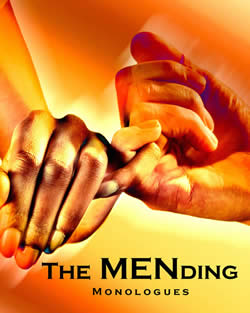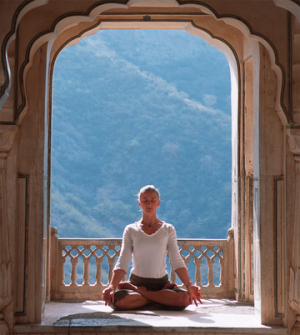 The male version of The Vagina Monologues. So, it's about penises? No, actually, in my opinion it is a play that is way more creative and socially conscious. As their website explains, it's "a love letter to women, a healing for men, and a call to end violence in all its forms."
The male version of The Vagina Monologues. So, it's about penises? No, actually, in my opinion it is a play that is way more creative and socially conscious. As their website explains, it's "a love letter to women, a healing for men, and a call to end violence in all its forms."
A couple weeks ago, Diversionary Theater in San Diego hosted several performances of Eve Ensler's The Vagina Monologues, as well as the much newer MENding Monologues. My friend and co-creator Chef Jenn treated me to the MENding Monologues as a birthday present and as an experience to add to our repetoire of knowledge for our Cooking Up Seduction enterprise. We sat in the front row. We weren't going to miss a thing.
The opening scene sent chills down my arms. Fifteen women sat on stage. Women? I recognized them as the cast for The Vagina Monologues. One by one the men of the show walked out from different sides of the stage, and while making a powerful statement, took a standing position behind each woman. "You think I'm the guy who slips roofies into your drink." I wish I could remember more of the exact phrases uttered as they brought to glaring awareness the number of negative predatorial assumptions we can make about men. Once the men were all in place, each woman stood, inviting the man to take her seat, speaking about the need for us to work together to address these topics that impact us all: respect, abuse, violence, communication, gender roles, and empowerment.
Already I was moved by the risk they were taking to tackle these topics.
Similar to The Vagina Monologues, this play is a mix of individual monologues and group pieces, ranging from hysterically poignant, to creative and thought-provoking, to moving and deeply disturbing. A man discussing the impotence he feels when witnessing a neighbor's abuse and being powerless to stop it. Gay men discussing how they don't love vagina, but that they can get behind loving the concept of symbolism of "vagina." A labiaplasty doctor explaining how women surgically alter their vulvas. A boy's despair when a trusted family priest inappropriately touched him. A young soldier returning home to his family and questioning who are the real heroes. Learning tantric practices. Appreciating women. Witnessing birth. Male hair removal. This play offered an array of insightful perspectives on masculinity and femininity, what we do with them, and how we live with it.
I was impressed. As a sociologist specializing in gender and sexuality, I am particularly critical of social commentary on such topics. But the nuances and depth of the MENding Monologues allowed the audience to be entertained, moved, and challenged. I don't want to reveal too many of the specifics of the pieces because I hope you will have the chance to see the show, view the DVD, or purchase the script and have your own experience of the material.
We do have a lot of mending to do as individuals, communities, and a society. This play's power is in avoiding the simple band-aid approach to fixing social problems and gender relations. They offer a paradigm shift to a vision of true appreciation, healing, and unity.
Learn more about the play and creators at their MENding monologues website.
Sex Therapy & Relationship Counseling in San Diego















































